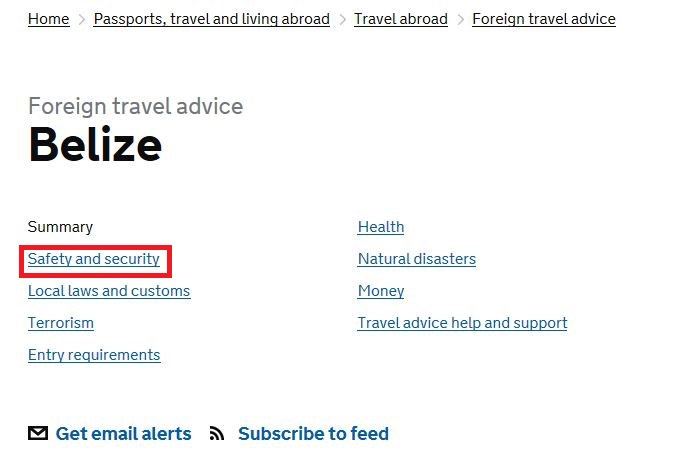 Crime is a worldwide problem and in most cases you should take sensible measures to try and avoid trouble in the same way that you would at home or at University. However it is also true that the prevalence and severity of crime may be higher in some locations than others – use FCO advice to help you research this in advance. Personal vulnerability is an important factor to consider, for example, in developing countries your comparative wealth may identify you as a target.
Crime is a worldwide problem and in most cases you should take sensible measures to try and avoid trouble in the same way that you would at home or at University. However it is also true that the prevalence and severity of crime may be higher in some locations than others – use FCO advice to help you research this in advance. Personal vulnerability is an important factor to consider, for example, in developing countries your comparative wealth may identify you as a target.
Examples of crime you may encounter include:
- Petty theft - e.g. bag-snatching, pickpocketing, snatch-and-run. Resulting in loss of ID documents or personal belongings
- Robbery/mugging – use of violence or threat of use of violence, without a weapon, loss of ID documents and other belongings
- Robbery at home/office/accommodation* – loss of ID documents or personal belongings
- Sexual assault – invasive, unwanted sexual contact
- Armed robbery – use of violence or threat of violence with a weapon (blade, firearms etc.)
- Abduction/kidnap – conducted by armed actor group or criminal entity for financial gain or political leverage
*Unless accommodation has been arranged for you by the University then suitability of where you stay is entirely your responsibility. This includes contractual responsibility as well as an obligation to ensure that the security of where you stay is satisfactory.
- If crime (general or a particular type of) is particularly prevalent in the area you are travelling to then please describe.
- It is also useful to identify any personal vulnerabilities in advance that may make you a higher target and think about what you can do to be less susceptible and blend in more.
- What will you be taking with you? What is the likelihood of loss or theft and the severity if this does happen e.g. where will you obtain new documents from?
- Indicate whether there is a particularly high risk of harassment or assault in the area that you propose to visit. Also explain whether you are particularly vulnerable to this threat and why; in some locations harassment of foreign women is not unusual including uninvited physical contact and unwanted attention.
- Include where you will be particularly exposed to these threats e.g. frequent lone travelling, during the course of your work/study or in busy town centres and on public transport. Identifying where the risk will be highest will help you to control it more effectively.
- Other factors that could increase vulnerability include alcohol/drug use which may lead to travellers to dropping their usual guard.
- Poor security at accommodation.
- History of safety and security issues with international hotels or accommodation in the area.
- Take advice from local police or municipality about areas that should be avoided and if known in advance include those in your assessment indicating that you will not visit these areas. If you must visit high risk areas as part of your work what will you do to further control threats? Travel only at certain times of day, do not travel alone, for example if known, demonstrate awareness of local scams or hotspots.
- Explain how you will be careful with possessions and keep a discreet attitude.
- Agree to keep a charged mobile and (if necessary) a portable alarm at all times.
- Carry a minimum amount of cash or take two purses - one with a small amount of petty cash so that your money is not on display when making purchases.
- Record details of passport numbers, issue dates, etc. and store separately both with you and at home.
- Do not carry unnecessary identification or credit cards in case they are stolen. Only carry what is strictly necessary.
- Avoid wearing expensive items.
- If travelling alone avoid situations that may leave you isolated with someone you do not know or trust, tell a trusted person your intended itinerary and arrange a time to check-in with them.
- Be vigilant when using cash points.
- Drink responsibly, alcohol impairs judgement and can make you more vulnerable.
- Accommodation - research and book in advance, look for places with good standards of international level security. Inspect accommodation before agreeing to stay and where possible, avoid staying on the ground floor. Inspect the quality of locks on all windows and doors. Thieves are less likely to target upper floors of buildings.
- Provide up to date contact information for any accommodation that you are using. Ensure that you notify the University if you move accommodation.
